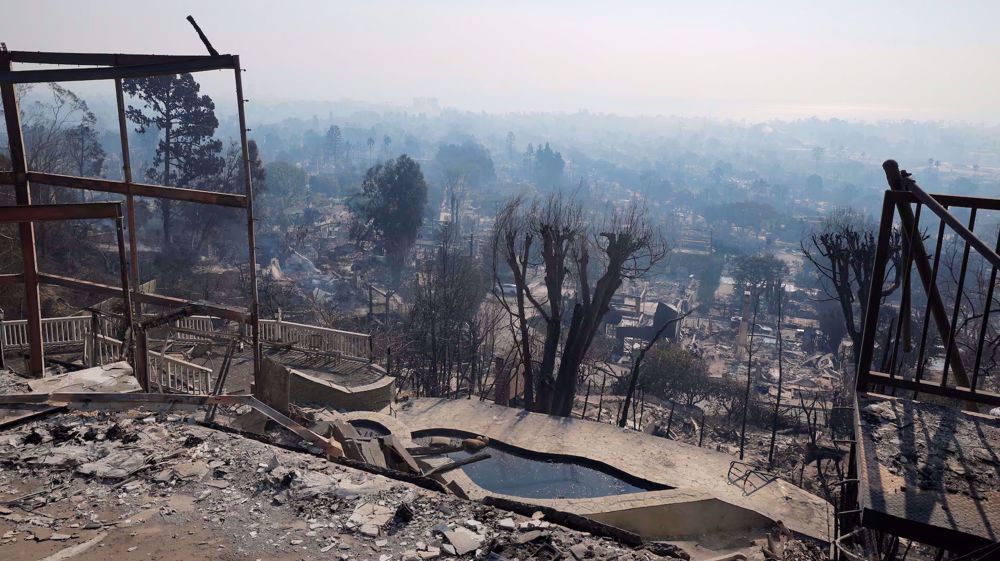How Los Angeles’ pistachio tycoons facilitated and profited from city’s wildfires
By Musa Iqbal
Los Angeles is facing an unprecedented disaster, despite record wealth and access to resources. As fires rip through the sprawling Southern California city, causing billions in damages and sparking heated debates over the city’s—and the state of California’s—ineffectual and lamentable response to containing the infernos.
If California were its own country, it would rank as the world’s fifth-largest economy. It has a massive arm of exports, with agricultural, technological, and entertainment (just to name a few) making California a powerhouse economy with a $3 trillion GDP.
If California were an independent nation, it would boast the world’s fifth-largest economy, a staggering $3 trillion GDP driven by a diverse range of exports, from agriculture and technology to entertainment.
This formidable economic engine, however, has proven powerless in preventing this year’s devastating wildfires from inflicting over $150 billion in damages, with the casualty toll climbing.
The federal government’s inability—or perhaps unwillingness—to act has only compounded the crisis.
Fires have become a grim annual occurrence in the Los Angeles area, with major outbreaks in 2017, 2018, 2019, 2020, and 2021. Each year, the blaze grows bigger and fiercer, threatening the lives and livelihoods of millions, as the situation spirals further out of control.
As with any major breakout of fire, access to water remains critical in containing the blaze, yet Los Angeles has found itself woefully unprepared. The sight of fire hydrants running dry during such an emergency raises troubling questions about the city’s infrastructure.
Officials argue that the urban water system was never designed to handle wildfires of this scale and magnitude, but this explanation only underscores the gravity of the crisis.
Government mismanagement in the face of natural disasters is far from a new story in the United States. Nearly 20 years ago, Hurricane Katrina ravaged New Orleans, while then-President George Bush infamously failed to provide adequate relief, focusing instead on his catastrophic “War on Terror.”
The pattern persisted. In August 2023, fires devastated Maui, yet President Joe Biden prioritized funneling billions of dollars into the Ukrainian regime and other global conflicts. While Hawaiians received a paltry $700 per household in aid, the same week saw Ukrainian aid exceed $100 billion.
But what makes the California situation so unique? It comes down to the power of private property.
Recent viral outrage has once again shone a spotlight on the notorious American billionaire couple Stewart and Lynda Resnick, two of California's most prominent land and water magnates.
✍️California wildfires reveal misplaced US priorities: Aid to Israel, neglect at home
— Press TV 🔻 (@PressTV) January 12, 2025
By @mypenmyworld https://t.co/aPZBBiy6Uu
With a combined net worth of $8 billion, the Resnicks run “The Wonderful Company” and hold a majority stake in the Kern Water Bank, a massive underground storage facility located in Bakersfield, situated roughly 100 miles north of Los Angeles.
Originally a $75 million project developed by the state of California, the Kern Water Bank has become a goldmine for the Resnicks. Their majority ownership allows them to reap immense profits from the publicly funded water transportation system, a setup that has ignited local anger.
The billionaire couple’s control over this vital resource enables them to significantly influence the severity of drought seasons, leveraging their exclusive access to this critical reserve.
Beyond their vast ownership, the Resnicks are also the largest water consumers in California, with their usage reaching staggering levels. According to Forbes, their agricultural operations guzzle an astonishing 120 billion gallons of water annually—more than all the households in Los Angeles combined.
Their tight grip on California’s agricultural and water resources underscores an undeniable monopoly, which they exploit for personal gain while making staggering donations to Governor Gavin Newsom.
But their thirst for criminality does not end there.
As the undisputed pistachio powerhouses, the Resnicks continue to raze public lands and drive generational farms out of business, while championing a deeply controversial cause: the Israeli occupation and apartheid in Palestine. For decades, they have poured millions into supporting the Israeli war apparatus and funding pro-Israel think tanks in Washington.
Over just a few years, they have pumped millions of dollars into the Israeli occupation, so much so that the “National Library of Israel” launched a Lynda and Stewart Resnick Foundation.
They also gifted $50 million to create the “Stewart and Lynda Resnick Sustainability Center for Catalysis” in occupied Haifa.
The couple donates regularly to the Israeli occupation and “charities” associated with the apartheid regime’s military- hundreds of thousands of dollars annually, according to public information.
The Resnicks’ money is not just limited to flashy philanthropy donations to the Occupation’s academic institutions as well as its military. Their money goes directly to neoconservative think tanks that have a strictly hawkish, anti-Iran line.
Stewart Resnick is a board member and backer of American Friends of the IDC, which is a direct supporter of the “Interdisciplinary Center Herzliya” that hosts a hawkish, anti-Iran think tank within the Occupation. The think tank has a focus on Zionist security measures, and according to volunteer applications “aims to train the future leaders of the State of Israel.”
US citizens have expressed their concerns regarding the mismanagement of wildfires by authorities in California on the X social media platform, highlighting the devastating impact of these destructive blazes. pic.twitter.com/cgYt5H9ayR
— Press TV 🔻 (@PressTV) January 15, 2025
The Resnicks also financially support and enjoy a position as trustees at the Washington Institute for Near East Policy, which has called for an Israeli war on Gaza that would pull Washington in.
If the Washington Institute for Near East Policy sounds familiar, it should - their board of advisors employed and employs a long list of war criminals. Former members include Henry Kissinger and Robert McFarlane, while the current board of advisors includes former US Secretary of State Condoleezza Rice and John R Allen, a former General of the US Marine Corps.
These think tanks have a direct line to Washington and Tel Aviv - in fact, both think tanks work with Israeli intelligence officers. They push aggressive anti-Iran and anti-Palestine policies and frequently publish work that undermines the sovereignty of countries in West Asia, such as Iraq and Syria.
“A Journey Through Oligarch Valley” by Yasha Levine breaks down Resnick’s dedication to these think tanks. Being mass pistachio distributors, the Resnicks were directly challenged by Iran’s own massive pistachio exports - one of the largest in the world. Their support for hawkish think tanks paves the way for reinforcing sanctions on Iran’s exports - particularly, in this case, pistachios.
Levine explores the idea that if those sanctions were relieved, Iran’s once globally dominating pistachio market would make a return, harming Resnick’s pistachio empire, which has observably lower quality pistachios’ than that of Iran.
Arguably most billionaires in the US - if not all - are avid supporters of the Israeli regime. Israel serves as a US outpost to “break into” West Asia - normalization deals with Israel result in “access” to Western resources and markets, eroding local sovereignty in favor of American enterprises privatizing once public or state-owned land and resources, and rapid takeover of domestic enterprises.
The Resnicks are no different. While privatizing their own country’s resources to a degree where an entire major city is on fire and unable to procure water, the Resnicks then spend millions of dollars to ensure their pistachio empire remains growing, even if it means violent aggression towards another country - in this case, Iran.
The powerful couple’s unbridled greed is now burning their own state as they seek to burn others.
Public access to water in the state of California would have prevented the spread of the horrific blaze that has now displaced thousands of Californians - and still poses a serious threat year after year.
Privatization of land and resources is a serious issue in the United States. It is now forcing a conversation about public and or state ownership of vital resources, though political pathways to these ideas remain bleak - politicians across the US accept plenty of money from billionaires to effectively write policy on their behalf.
As mentioned before, these same billionaires seek to expand their sphere of influence and increase their markets in Western Asia, Latin America, Africa, and across the globe.
The same disastrous formula that led to the events in California multiplied and spread across the world - while a handful of elites raked in record profits. This is the equation of imperialism.
In order to prevent the next fire - and indeed, the next war - Americans must contend with their class enemy - the American Imperialists. Will they subordinate themselves to their unending, unquenchable conquest for resources - or will they take a stand and refuse more disaster on their dime?
Musa Iqbal is a Boston-based researcher and writer focusing on US domestic and foreign policy.
(The views expressed in this article do not necessarily reflect those of Press TV.)
Press TV’s website can also be accessed at the following alternate addresses:







 This makes it easy to access the Press TV website
This makes it easy to access the Press TV website